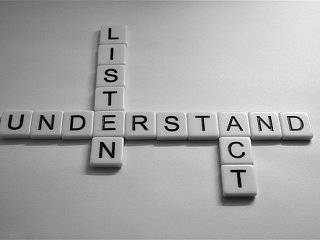5 Steps for an Effective Communication

Sometimes interacting efficiently with others can be hard because of the difficulties in mutual understanding. Although this is a common problem, it can however be solved, or at least improved, with a simple and easy-to-apply solution.
The solution primarily involves active listening which leads to improved understanding of others, building relationships and developing reciprocal trust.
Whether or not people like you is strictly related to how you interact and, specifically, how you listen to others. In business, obtaining and evaluating feedback is important in order to understand customers’ needs and develop satisfaction. There are indeed people who were born with a sort of talent for communication, who easily gets along with everybody and sometimes raise a sort of envy in those introverted people who find difficulty in interacting. However, it is important to know that everybody can be a good communicator with a bit of practise and training.
Here you will find some useful tips to improve your communication.
1. Listen and show interest Ask people to tell you something about themselves. Almost everybody deeply loves himself and one of the most loved things to do is to share one’s own opinions and stories. Instead of starting conversation with “I am”, try to begin by outlining the word “you”, moving the focus to the other and listen to what they have to say. If you just can’t avoid talking about yourself, try to avoid making monologues and attempt to engage the other in interactive conversations, ending the sentences with expressions such as “and what about you?” to invite the other to share their opinions. Whatever the topic you are discussing may be, something that appears futile to you could be important to the other. Therefore, attempt to show interest during the entire conversation, and try to understand what topics are important to the other, in order to focus on them and improve satisfaction and happiness of the person you are talking to. Nobody likes to be yawned at while expressing their ideas or outlining their dreams.
2. The importance of the name The first thing that makes us feel unique is our name. At school, names are the factors that identify the individuals and distinguish them from the group. When we grow up, we tend to use a direct approach with people without really repeating their names very often. Saying somebody’s name helps to emphasize the role of that person in the conversation and develops a sense of intimacy and involvement. Also, from a business perspective, using a person’s name in the middle and at the end of a conversation helps impress the counterpart because that person will be impressed and appreciate the fact that you remember their name.
3. React with flexibility During your conversations, there may be some topics in which you and your interlocutor are especially interested. This could allow the creation of a very positive interaction, in case of agreements on the topic, or raise debates and contrasts, in case of different opinions. To develop a constructive and positive environment and to avoid creating contrasts, try to show strongly your appreciation when you agree with the other’s ideas while disagreeing softly in case of dissatisfaction with the interlocutor’s opinions. This would allow the creation of a constructive environment, with a common topic to develop together, in case of mutual agreement, and a constructive debate to rise through comparisons, in case of disagreement or different ideas.
4. Listening pays more than talking When somebody is talking to you, do your best to catch the messages and follow the story by showing attention, making eye contact, nodding and appearing engaged in the discussion. Try to get cues from the dialogue and ask pertinent question which will show your interest on the topic. Ask more information if you have doubts and before quoting words from your interlocutor use sentences like “If I am not wrong you said that…” in order to prevent eventual miscommunication in case of previous misunderstandings, and engage the other in case of an effective understanding of his stories.
5. Be focused on the topic Changing topics and interrupting somebody while they are talking can be unpleasant for the speaker. Sometimes it happens instinctively because we believe we understood the point of the other, and we attempt to finish their sentences out of habit to show our understanding. However, sometimes people may intend to say something different or add some other points before closing the topic. Therefore, allow the other person to clearly express their thoughts by giving them enough time to complete their sentences before you answer. Your capacity to listen will be recognised and this will help others develop positive feelings toward you.
Written by: Pietro Paolo Frigenti
